iLoud Bluetooth Speaker System

Introduction:
 The iLoud is a welcome addition to the Bluetooth speaker marketplace because of its solid build quality, portability, long-battery life — all qualities that will appeal to listeners, like me, at large. The iLoud’s general usefulness extends to people who are not consumer electronics devotees, including my girlfriend who asked “Honey, can we keep it?” Unfortunately, although the unit is primarily designed with recording musicians in mind, one niche audience that it will satisfy, this unit unfortunately forsakes one particularly important group: hi-res devotees, of which I am a member. Read on to find out more…
The iLoud is a welcome addition to the Bluetooth speaker marketplace because of its solid build quality, portability, long-battery life — all qualities that will appeal to listeners, like me, at large. The iLoud’s general usefulness extends to people who are not consumer electronics devotees, including my girlfriend who asked “Honey, can we keep it?” Unfortunately, although the unit is primarily designed with recording musicians in mind, one niche audience that it will satisfy, this unit unfortunately forsakes one particularly important group: hi-res devotees, of which I am a member. Read on to find out more…
Background on company
IK Multimedia was launched in 1996 with the aim of replicating analog sound from computer-based systems and continued to release first-of-its-kind software for a decade that replicates the use of instruments through an electric piano app (and others) for use in composing and recording. The iLoud dropped in 2013 to support this mission albeit as a complement to the software as the speaker can be used to amplify instruments while recording and as a monitor for sounds streamed from an iPad running IK’s apps.
Look
The iLoud echoes the shape of my iPad with a similar height and width albeit much thicker. It uses thick black plastic with a perforated grill and a sticky rubber stand which gripped the kitchen counter-top beneath confidently. The aesthetic is contemporary with clean lines and a slim form-factor. It’s look reminds me of the Beats by Dr Dre Beatbox iPod Dock which was praised by CNET for its “edgy industrial design with minimalist styling” and echoes the Beatbox’s use of a large circular volume button, though the iLoud’s knob is illuminated by an ever present red-glow, reminiscent of Microsoft’s Xbox “red-ring-of-death”. The addition of a Beatbox like carry-handle would have been a welcome addition and provided the iLoud with a more youthful “party-box image”— though I am glad the iLoud avoided a “party-box” sound-signature — a place to put your fingers would provide the utilitarian benefit of enhancing its transportability.
Feel
The iLoud feels solidly built with what I perceive to be injection molded plastic and seems durable enough to be jostled about frequently in transport without disintegrating.
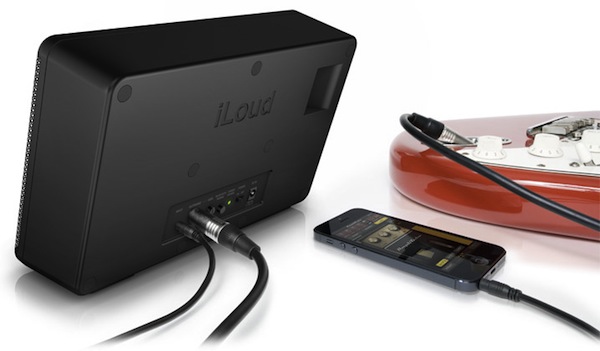
What it is designed to do
The iLoud is the only Bluetooth speaker on the market developed with on-the-go recording musicians as the intended consumer as opposed to the general public with regard to its sound though many of its elements will appeal to just about everybody. As a result, it wasn’t given the bassy treatment found in the Bose SoundLink II that typical “Big Box” store consumers seem to crave which reduced midrange playback in order to emphasize the low-end. Instead, the iLoud has a neutral sound signature and realistic midrange with which for artists to examine their mixes while on the road or between their class/work schedule and is supremely portable at 3lbs and circumvents the inconvenience of lugging around heavy studio monitors.
Consequently, the back of the speaker includes inputs for a microphone or for a guitar which is clearly no gimmick—this demonstrates the company’s holistic approach to creating a production environment that leverages improvements in modern technology-in this case a 40 watt amplifier with DSP processing to create a studio monitor that is both adequately loud while retaining a sufficiently small footprint. This mobility is further leveraged when coupled with IK’s iPad based AmpliTube guitar software or Android-based iElectric grand piano/iLectric electric piano software is used in conjunction with the speaker which masterfully illustrates their commitment to developing mobile-recording tools that circumvent the need for a dedicated recording room or desktop as recording can be done from merely the speaker, a tablet, and a laptop. Adeptly, the iLoud manages to achieve the aforementioned feat but also can be viewed, in a sense, as a lifestyle product for all transient professionals including myself as it fits neatly in my 14L bicycle backpack which measures 28cm X 42cm X 12cm with room to spare. Thus, the supreme portability of the iLoud meshes with my active, gypsy habits and is my go-to speaker for road trips as it delivers a satisfying listening experience in hotel rooms as well as in my friend’s big-city cramped err cozy apartments and condos.
The iLoud boasts dual 3/4″ tweeters and dual 3″ midrange drivers which do crank quite loud with minimal distortion, and can be considered part of the same product category as the Beats by Dr Dre’s Pill XL Bluetooth speaker. Dr Dre’s Pill XL Bluetooth speaker, which has according to Digital Trends, two 3/4″ tweeters and two 1.5″ drivers (not to be confused by the Beats by Dr Dre Beatbox with which it shares a similar aesthetic). Frustratingly, I doubt the iLoud was designed with the intent of supporting masterful hi-res playback.
Listening experience
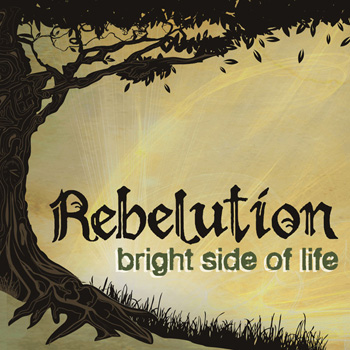 The iLoud possesses attributes traditionally associated with HIFI equipment: a solidity of build and also a sonic accuracy when reproducing recordings. There is no hint of coloring or imbalance across many genres of my personal music collection which includes reggae, jazz, and rock. Because of its neutral sound-signature, the iLoud fulfilled its purpose with standard 16-bit/320kbps files were played through it. Eric Rachmany’s vocals came through clearly as did the trumpet on Rebelution’s “Change Up The System” on Bright Side Of Life. There was also decent separation between Michah Pueschel’s voice in “Stay Awake” on Iration’s ‘Hotting Up’ in and the accompanying chorus and the speaker demonstrated a fine sense of musicality in its timing with regard to the drum part which provided the necessary backbeat, as it should, yet didn’t denigrate the vocal sections. P.O.D.’s “Strength Of My Life”(acoustic) from ‘SoCal Sessions’ achieves the same feat-although drums are prominent in the mix, vocals are intelligible and shine through. The same could be said of Mark Isham’s instrumentals in Brian Wilson’s “Half Moon Bay” on ‘No Pier Pressure,” streamed on Tidal. Then, Lana Del Ray’s “Cruel World” from ‘Ultraviolence’ envelopes the listener with a buzzy surf-rock opening and room encompassing vocals which position the iLoud at it’s most capable: between its non-resonant cabinet enclosure and this genre of music, Lana’s voice is the most ambient and cavernous of all of the demo tracks included in this sample.
The iLoud possesses attributes traditionally associated with HIFI equipment: a solidity of build and also a sonic accuracy when reproducing recordings. There is no hint of coloring or imbalance across many genres of my personal music collection which includes reggae, jazz, and rock. Because of its neutral sound-signature, the iLoud fulfilled its purpose with standard 16-bit/320kbps files were played through it. Eric Rachmany’s vocals came through clearly as did the trumpet on Rebelution’s “Change Up The System” on Bright Side Of Life. There was also decent separation between Michah Pueschel’s voice in “Stay Awake” on Iration’s ‘Hotting Up’ in and the accompanying chorus and the speaker demonstrated a fine sense of musicality in its timing with regard to the drum part which provided the necessary backbeat, as it should, yet didn’t denigrate the vocal sections. P.O.D.’s “Strength Of My Life”(acoustic) from ‘SoCal Sessions’ achieves the same feat-although drums are prominent in the mix, vocals are intelligible and shine through. The same could be said of Mark Isham’s instrumentals in Brian Wilson’s “Half Moon Bay” on ‘No Pier Pressure,” streamed on Tidal. Then, Lana Del Ray’s “Cruel World” from ‘Ultraviolence’ envelopes the listener with a buzzy surf-rock opening and room encompassing vocals which position the iLoud at it’s most capable: between its non-resonant cabinet enclosure and this genre of music, Lana’s voice is the most ambient and cavernous of all of the demo tracks included in this sample.
The device’s hiccup arrived when hi-res tracks were introduced. With Amy Winehouse’s “Back To Black,” in 96/24 from HDTracks.com, which includes bass guitar, drums, guitar, piano, tambourine, violin, viola, cello, alto sax, tenor sax, baritone sax, individual instruments weren’t always distinguishable and the replication of each the instruments sometimes came at the expense of clouding the others. Then, in “Tears Dry On Their Own” Winehouse’s vocals were on display, front-and-center without the healthy, balanced blend of accompaniment of baritone, tenor, and alto saxes, bass trumpet, and flugelhorn and background vocals that were supposed to exist.
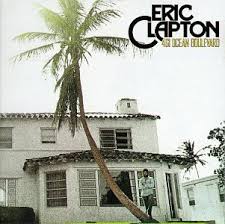 On Eric Clapton’s “Get Ready” from 461 Ocean Boulevard in 192/24, Clapton is confident while Yvonne Elliman’s accompanying vocals are breathy backed by a consistent good ole American finger pickin’. Although I was satisfied with the separation between vocals and instruments with Rebelution’s “Change Up The System” in standard res, when confronted with hi-res tracks, some bleeding occurred and the separation the iLoud achieves could be improved. Case in point, Clapton’s tune appears guitar-centric as “Back To Black” appears vocal-centric, and “Get Ready” appears to be structured around the almighty axe. which reduces listener’s perceptibility of lyrics, which bears no relation to the original mix which is pristine, a fault that can be attributed to the iLoud which over-emphasized guitars over Clapton’s in the former, and vocals over instrumentals in Winehouse’s in the latter. I confirmed this by listening to “Back To Black” and “Get Ready” through Westone W20 in-ear-monitors, the Oppo HA-2 DAC and headphone, both of which were reproduced with remarkable balance and separation without an inappropriate emphasis on parts.
On Eric Clapton’s “Get Ready” from 461 Ocean Boulevard in 192/24, Clapton is confident while Yvonne Elliman’s accompanying vocals are breathy backed by a consistent good ole American finger pickin’. Although I was satisfied with the separation between vocals and instruments with Rebelution’s “Change Up The System” in standard res, when confronted with hi-res tracks, some bleeding occurred and the separation the iLoud achieves could be improved. Case in point, Clapton’s tune appears guitar-centric as “Back To Black” appears vocal-centric, and “Get Ready” appears to be structured around the almighty axe. which reduces listener’s perceptibility of lyrics, which bears no relation to the original mix which is pristine, a fault that can be attributed to the iLoud which over-emphasized guitars over Clapton’s in the former, and vocals over instrumentals in Winehouse’s in the latter. I confirmed this by listening to “Back To Black” and “Get Ready” through Westone W20 in-ear-monitors, the Oppo HA-2 DAC and headphone, both of which were reproduced with remarkable balance and separation without an inappropriate emphasis on parts.
That observation notwithstanding, individual instruments such as Eric’s guitar part are satisfying, even if the blend should be much more balanced, and the iLoud demonstrated its aptitude in replicating those sounds; although I did not plug a guitar into the back input, I would extrapolate that traveling axe-wielders will find this speaker to be a very capable monitor for their activities.
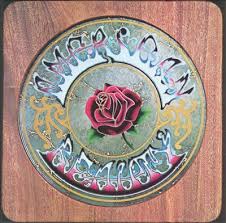 Later, with The Grateful Dead’s “Box of Rain” from American Beauty in 96/24, I noticed the piano part for the first time, likely because I had previously experienced the song at 128kbps years ago with the inadequate and tinny earphones that arrive with the iPod. The iLoud provides a convincing sense of depth, stereo imaging and presents a Fender Telecaster (lead guitar), acoustic guitar, bass, and piano with adequate though not wholeheartedly fulfilling separation between the instruments. “Friend of The Devil,” echoes “Get Ready” in its finger pickin’ however, as a whole, ‘American Beauty’ is a much better sample album on which to show off the unit’s prowess than ‘461 Ocean Boulevard’ in which instruments appear to overlap together and the former is definitely a suitable choice.
Later, with The Grateful Dead’s “Box of Rain” from American Beauty in 96/24, I noticed the piano part for the first time, likely because I had previously experienced the song at 128kbps years ago with the inadequate and tinny earphones that arrive with the iPod. The iLoud provides a convincing sense of depth, stereo imaging and presents a Fender Telecaster (lead guitar), acoustic guitar, bass, and piano with adequate though not wholeheartedly fulfilling separation between the instruments. “Friend of The Devil,” echoes “Get Ready” in its finger pickin’ however, as a whole, ‘American Beauty’ is a much better sample album on which to show off the unit’s prowess than ‘461 Ocean Boulevard’ in which instruments appear to overlap together and the former is definitely a suitable choice.
The iLoud does seem to have a better grasp on purists genres such as acoustic, classical, instrumentals, and jazz in cases where the total number of parts are kept to a minimum because instruments themselves sound quite good on this device; its drawback is contingent on its challenges with blending multiple parts like the mini-orchestra backing Winehouse in “Back To Black” which features more than half a dozen-parts.
While I’m happy the unit isn’t a bloated-bass party-box with artificially inflated volumes which distort the sound-signature to deliver more low-end, I’d like a speaker that is more hardcore. The iLoud chokes on edgier content such ‘Oceas Green Day’s “Holiday” on ‘American Idiot’ in 192/24 and The Silversun Pickups “Nightlight” from ‘Better Nature’ in 48khz, 24-bit both of which produced less electric guitar feedback distortion with the iLoud than with Audioengine’s A5+ powered speaker which is likely a consequence of the latter’s larger 5″ Kevlar drivers though both have 3/4″ tweeters. Even with the volume cranked to the max, the experience delivered was more clinical than visceral, for which we should designate the unit with commendable engineering chops however, Billy Joe Armstrong’s ferocity has never sounded this clean, and the same could be said of The Silversun Pickups and Eric Clapton. Perhaps IK could release an updated version of the speaker for followers of classic and hard rock to deliver more grit, feedback, and distortion to allow fans to feel as if they’re present at the performance.
Improvements
While the iLoud proved satisfactory for the majority of my listening needs, the addition of Bluetooth 4.0 with Apt X would improve sound-quality considerably without adding dramatically to its cost of the as Libratone’s Zipp speaker ($400, only $100 more) includes that very codec coupled with WiFi, both of which allow streaming without degradation of the signal. In addition, greater consideration for blending of instruments and vocals with hi-res playback is needed.
Conclusion
Highly recommended for individuals for listening to 16-bit or 320kbps Spotify streaming and for on-the-run recording musicians however, I am reticent to recommend this speaker to hi-res devotees because while it excels in replicating individual instruments, and will meet the needs of a singer-songwriter that consists of vocals and an acoustic guitar, or vocals and a piano, the iLoud did not yield the listening experience I desired in the playback of my favorite hi-res recordings.


mark abell
iLoud Specifications:
Price: $299.00
40W total power (2x16W low-frequency, 2x4W high frequency).
Frequency response 50Hz to 20kHz.
Four Class-D Amplifiers, bi-amped system.
Two way 2×3” neodymium woofers & 2×3/4” neodymium tweeters.
High performance bass-reflex port.
1/4” iRig® input for connecting guitars and dynamic microphones to iOS devices.
Bluetooth compatible with A2DP protocol.
1/8” stereo analog line input.
DSP controlled.
Superior low-frequency extension and sound accuracy.
Auto Standby.
Integrated high-performance Li-Ion rechargeable battery.
Battery duration at maximum volume: up to three hours. Normal usage: up to ten hours.
Package includes
iLoud speaker
Power supply
Power supply cable
TRRS audio cable (1m/3.3ft)
Quick start guide
Registration card
Size: 250mm/9.84″ x 160mm/6.3″ x 60mm/2.36″ (W x H x D)
Weight: 1,330g/46.91oz
Stereo Times Masthead
Publisher/Founder
Clement Perry
Editor
Dave Thomas
Senior Editors
Frank Alles, Mike Girardi, Russell Lichter, Terry London, Moreno Mitchell, Paul Szabady, Bill Wells, Mike Wright, and Stephen Yan,
Current Contributors
David Abramson, Tim Barrall, Dave Allison, Ron Cook, Lewis Dardick, John Hoffman, Dan Secula, Don Shaulis, Greg Simmons, Eric Teh, Greg Voth, Richard Willie, Ed Van Winkle, Rob Dockery, Richard Doran, and Daveed Turek
Site Management Clement Perry
Ad Designer: Martin Perry



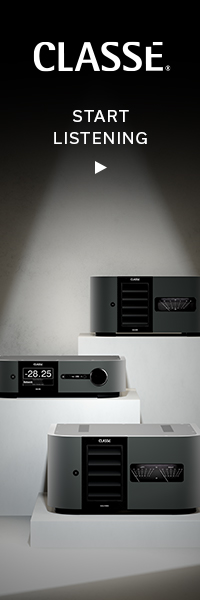
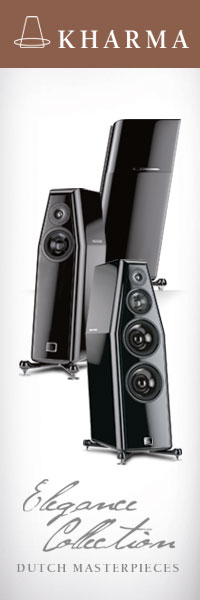
Be the first to comment on: iLoud Bluetooth Speaker System